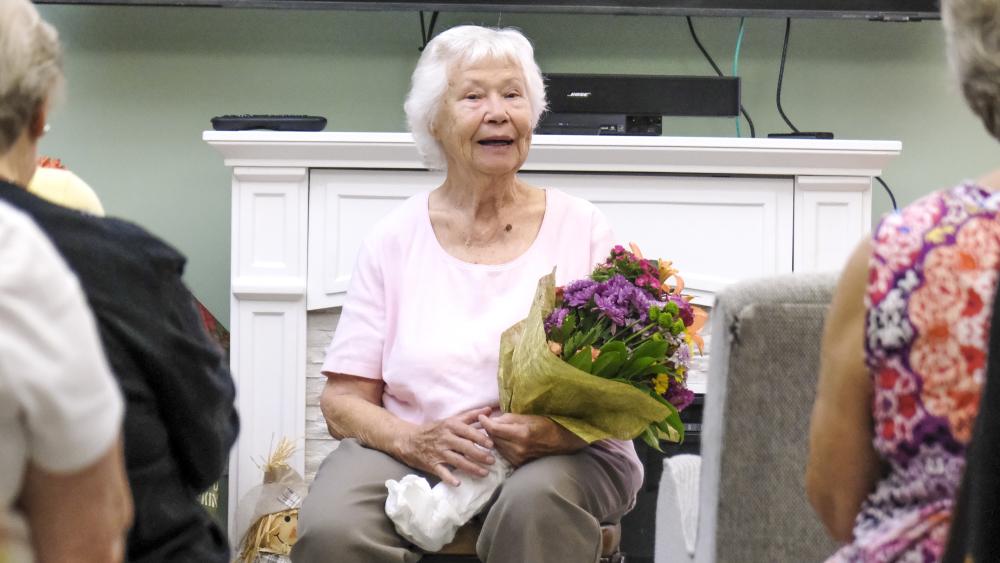A story of resilience: World War II Wolf Child survivor shares experiences at Lakeville Center on Aging


LAKEVILLE — “Don't take life so seriously, be more at ease. Things will be good and not so good. It's a good thing to not hold grudges,” said Inge Pustelnikas, 89, a World War II survivor who is part of a group called the German Wolf Children.
Pustelnikas was born in Germany in 1935 and grew up in the town of Königsberg during World War II. Near the end of the war and after being separated from her family, she escaped to Lithuania at age 10 in search of food and survival — becoming what was later known as a German Wolf Child.
German youth who were orphaned or separated from their families fled to East Prussia and Lithuania following the war and subsequent occupation of Russian forces. Much of Germany was destroyed and mass starvation and illness spread, causing many to flee to find basic necessities.
Along with other children, Pustelnikas traveled through woodlands by foot and train-hopping in hopes to find a means to survive. Due to their nomadic and resilient lifestyle they found themselves in, these children were dubbed German Wolf Children.
“When the train would stop we would jump off and hide, and when it started again we would jump back on; doing this as nine and ten-year-olds was dangerous,” Pustelnikas said.
Pustelnikas lived on the kindness of strangers for food and shelter for 15 years as she grew out of her youth in Lithuania. After receiving help from a Lithuanian woman in 1959, she eventually made her way back to Germany where she found her mother, sister and brother — family members she hadn’t seen in over a decade. Her father died at their family home during the war.
When reuniting with her mother Pustelnikas said, “we couldn’t speak at first, we just cried. I forgot how to speak German, and she didn’t speak any Lithuanian.”
After finding her family, Pustelnikas later married and moved to the United States.
At the Lakeville Center on Aging, Friday, Sept. 19, Pustelnikas shared her journey of survival and the search to reunite with her lost family.
During the presentation, a film showing — created by an author and longtime friend, Kristen Arute, who is publishing a book about Pustelnikas’ life — played before Pustelnikas answered questions about her story from a crowd of about 50 attendees.
“When you grieve, pick up the pieces and ‘clean house’ — then do it all over again,” Pustelnikas said on how she has overcome the dangerous challenges and grief she has experienced.
“She didn't have a family growing up, everybody was her family,” said Arute. “She would go and stay at home for a night, and that became her family. She told me that she would call everyone where she stayed mama and papa.”
Arute said the two have been friends for over ten years, and writing the book about Pustelnikas, a resident of Raynham, has taken years of interviewing and fact checking. According to Arute, Pustelnikas may be the only living German Wolf Child in the United States.
“The fact that she lives such a grounded, stable and ‘normal life’ now is so remarkable to me. It speaks to her resilience and ability to overcome,” Arute said.
Pustelnikas’ daughters, Bettina Hoffman and Kristina Rota, said they’ve learned a lot from their mother about independence and relying on one’s self to overcome challenges in life.
“This is a piece of history where people don't always see the viewpoints of the people that suffered. There's not much left of this history too, because the people that experience this have long passed away, but she is just strong enough and in no bitterness to share her story,” said Hoffman.
“She's grown up not needing much. Her whole life she hasn’t needed much. But she's also wanted to make sure that we always had a better life than her,” said Rota.
Lakeville residents Maureen Martowska and her husband Michael said they didn’t know what to expect when they signed up to attend the event, but they said Pustelnikas’ story was a “gift of inspiration.”
“What struck me was the lack of love that she missed: the birthdays, the Christmas holidays, yet she doesn’t have hatred or animosity. Most importantly, she has forgiveness for everything that happened and is still able to tell her story,” Maureen Martowska said.
This year marks the 80th anniversary of the end of World War II. Rota said she is working to publish her book about Pustelnikas’ life, titled “German Wolf Child”, by January.














